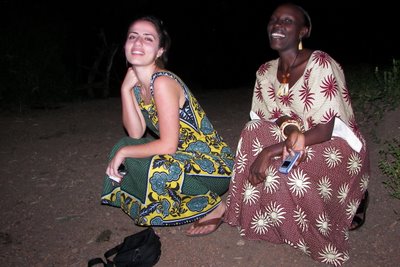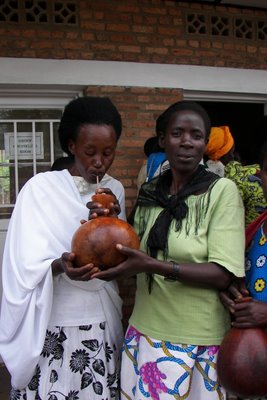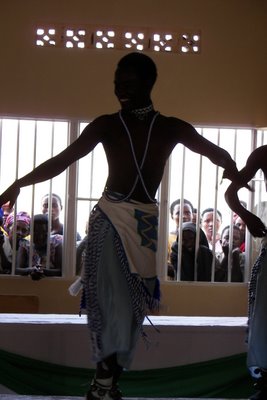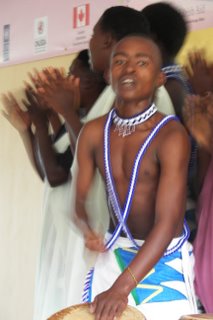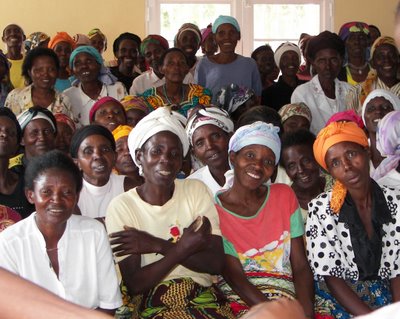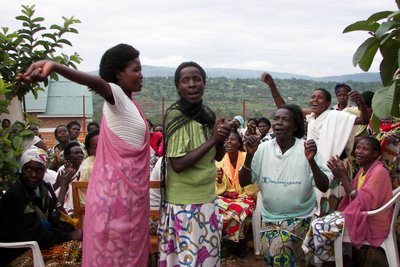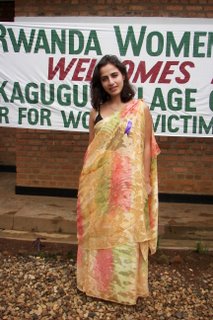I left my phone, and my heart, in Uganda
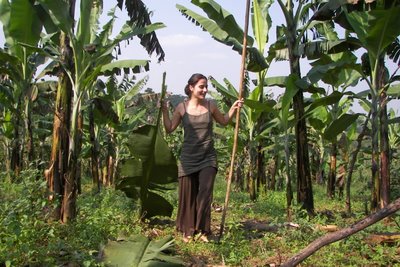
(This has been sitting in my computer since the 31st, when i got back. I've just been waiting for a good enough connection to upload all the photos with. hence, the delay)
Floss in Beirut, phone in Uganda, and all of my Nice Clothes in Palestine, my territorial pissings
are becoming a bit of a costly habit. What will I wear tonight?
Back in foggy, humid, almost-rainy Kigali, I already miss Uganda. My only souvenirs: exactly 28 mosquito bites on one leg, and a whopping 35 on the other (thus a skirt is out of the question). That said, Uganda is AMAZING – I’d make it my homeland any day.
So here’s the report of my trip that many of you have been asking for – I’ll stop when I get tired!
I finally made it despite getting turned back at the border the first time, having brought the wrong passport (the one with the Israeli stamps, but I entered Rwanda on the one with the Lebanese stamps. I blame the Occupation, of course). Getting back to Kigali after getting turned around was extra fun - as I hadn’t booked a ticket I hitched a ride with the really cheap taxis and rode with chickens and sat in between two fat men who were speaking to each other the whole ride, spitting on me, for two and a half hours.
The drive up was absolutely gorgeous - both on the Rwandan and Ugandan sides – through a landscape of lush green mountains, tea and banana plantations, and lots of tiny villages. I got to catch one of the greatest scenes on my way in on the 24th as families were butchering cows, goats and chickens in preparation for the next day’s festivities. So it was a green landscape, spotted with red spreads on banana-leaves for as far as I could see. And lots of people huddled around them in hungry anticipation.
To put my destination in perspective: Annette's family's village was a 4 hour drive from Mbarara, the nearest town. 2 of those hours are on a bumpy, holey, overlooked-by-Japan dirt road. There was absolutely no turning back.
Arrived at the village I was greeted by the surprised hosts (Annette didn’t tell them I was foreign, “white”!), given an orange Fanta (a luxury), and taken straight to the kitchen - Christmas was the next day and there was some serious cooking to do.
This is where we spent most of days, where most socializing was done, along with the cooking. And we’re not talking counters/sinks/refrigerator kitchens. See for yourself:

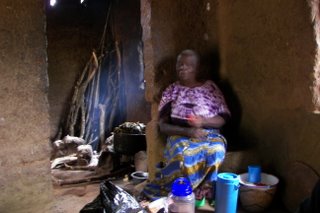
Lighting a fire took about half an hour and needed constant firewood which we had to fetch every day. Thus, the “kitchen” is where the women spent the majority of their days – and the one day I stuck it out with them, keeping watch on an enormous vat of boiling cow, I couldn’t sleep because of all the smoke inhaled by my eyes. And there were flies *everywhere* and it was useless trying to avoid them - that’s what happens when you live so close to your cattle. Food we were eating was covered in flies, we were covered in flies, and the out-house where we had to do all of our business was also filled with flies.
This brings me to the recurring theme of the week. As Annette put it: African women have got it bad. I've never felt like such a spoiled brat, having always thought of myself as fairly capable around the house. But I was physically unable to keep up. They were up before me and went to bed after me, taking very few breaks. They start by getting the fire going at 5 am in order to start heating the bath-water for everybody. Then boil that morning’s milk to make “tea”, and roasted corn and cassava for breakfast. While people (men, guests), are eating breakfast they're starting lunch. Ditto for dinner.
Xmas morning, lying on my concave mattress, I was terrified of facing the entire village at Church in less than an hour. Very few white people make it to these parts and even the family I was staying with were amused at my presence. I must have posed for at least 20 pictures with various people who wanted souvenirs, had my hair petted and examined numerous times and managed to cause general amusement every time I attempted to do something around the house (Hey! Come see, the white girl is doing the dishes! Or Haha! The white girl wants to help pluck the chicken!) before politely being shoved aside by a 12 year old girl who could do it better, faster, and the Right Way.
But I did go to Church on Christmas day for the first time ever, and subsequently interrupted the service by my mere presence. The preacher stopped preaching, the entire congregation turned their heads around to have a look and there was this terrifying murmur – the sound of “townspeople” in the movies. I decided to do God a favor and did a 180 (But they made me go back the next day).
But now for the meaty part: FOOD.
Never thought i'd say this, but i don't want to look at meat for another week at least.
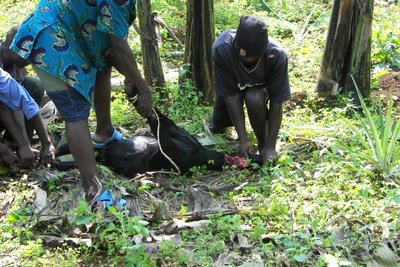
Did you know that fat could congeal on your lips and hands, and that it was virtually impossible to remove? Our first dinner they hadn’t brought the generator in yet so it was dark and I had absolutely no idea what I was eating. It took me some time to realize that that funny feeling on my lips was actually an entire layer of animal fat. This layer of fat would maintain its presence throughout the week.
I had brought this Crabtree & Evelyn (thanks Laura!) bar of lavender soap with me, which I used to try and scrub off the fat – but the two smells (lavender, dead animal) sort of became one. As I did my sniffing tests I could no longer tell whether what I was smelling was soap, or fat. Or both. The smell of lavender beauty products will forever remind me of boiled fat.
The 50 kilos of rice I brought weren’t enough. When Africans say “family” it includes cousins, second cousins, great aunts and uncles, adopted orphans (from friends or dead relatives), and anyone else who decides to show up.
Other than the rice, nothing was purchased. You eat what is available: so that's a lot of meat, plenty of bananas and plantains, millet-based mush (kind of like foufou), corn, cassava and these tiny onions that look like garlic and are hell to peel. Every day the menu is some combination of the above.
(One of the dishes that makes Palestinian mansaf look like peanuts in terms of fattiness is actually a snack I was forced to eat without flinching numerous times: chunks of (fatty) meat dipped in cow ghee.)
Other good things happened: I milked cows, held a goat’s legs still while it was being slaughtered, carried it’s insides to the kitchen, (tried to) pluck a chicken, gathered banana leaves for wrapping food in and at one point was left alone with about 20 bulls to watch– you know, in case something went wrong. I was never told what to do in case something *did* go wrong.
But all of this, I expected. What I didn’t expect was that in the midst of all of this, come sunset, the Man of the House (Annette’s uncle and sort of adopted father, the more affluent of all the uncles) would adjourn from the table where he eats to the couch where he sits to take his tea (heavy-creamed boiled milk with some tea-leaves and lots of sugar) and chew on some crunchy fried kidneys that his wife obediently brought for him. His attentions are turned towards his prized possession: A CD player/ stereo system, playing “Jim Reeves’ Special Christmas Collection.” He showed off the treasured CD case as I was asked to partake in this nightly ceremony by sitting down with him and also looking at the stereo - in complete silence.
Even in Africa, they Dream of a White Christmas.
The rest is in pictures: 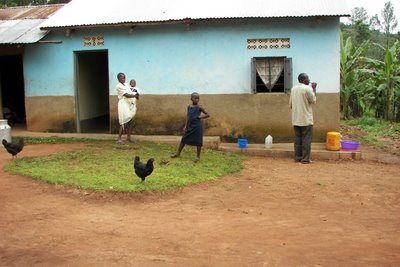

(The house)
Now some of the big party they had on the 27th to honor a family member that was coming back from 7 years in the US - perhaps symbolically, huge crates of COKE were brought in)
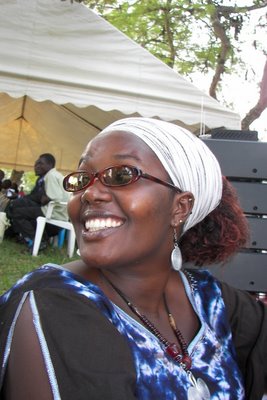

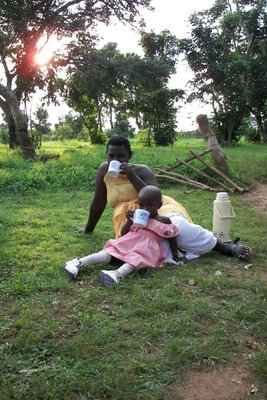
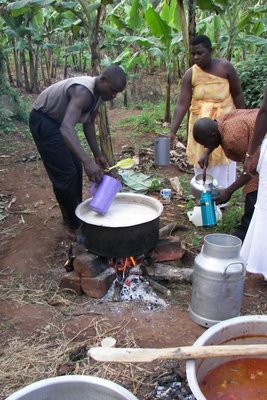 (boiling the tea for 60+ guests)
(boiling the tea for 60+ guests)
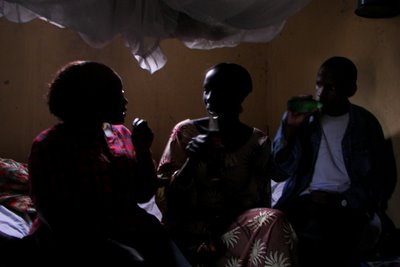
In the evening, in someone from the neighboring village's bedroom/living room/store, sipping on some really strong sugarcane liquor, which came in plastic sachets. This is right before we got a flat tire *and* ran out of gas on the way back, in the middle of nowhere, and had to walk for 2 hours at 2 am back to the house, among the sugar cane and banana plantations. We stopped at a local store turned-watering hole to ask for a lift but everyone was too drunk. So we just bought some more liquor and kept walking. The next one is Annette and I sitting on the side of the "road" waiting for the flat to be fixed, before we decided to just walk.
